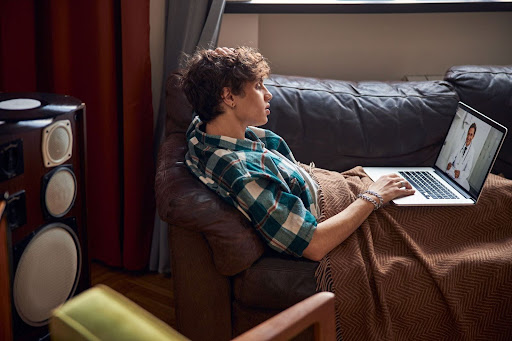The Pros and Cons of Social Media Use in Teens and Adolescents

A new study reveals pros and cons to social media use in teenagers. Empower your teen with strategies for positive online experiences and mental well-being.
Social media affects everyone differently. It can be life-saving to some and detrimental to others. A study done by Common Sense Media and Hopelab sought to understand how social media affects different young adults. They found a surprisingly detailed list of both pros and cons.
Many young adults acknowledge the negative impacts social media can have on their lives. Social media feeds are full of self-aware young adults advocating for better mental health and screen time usage, all from their phones. The problem is not that teenagers are unaware of the mental and physical health risks—it’s that they don’t want to stop. And maybe we shouldn’t stop them . . . at least, not completely.
Pros of social media
The study found that for many young adults, especially those of a marginalized background, social media served as a protective factor against mental health issues. When mental health therapists, parents, and child advocates are tackling the issue of screen time in our young adult populations, we must take care not to negate these two primary positive benefits:
- Connections with Peers
It’s common to hear “cut screen time” from teachers, coaches, and other parents. But new studies reveal this may not get to the root of the issue. Teenagers and young adults are feeling more lonely and disconnected than ever before, and social media offers an enticing and easy way to form connections. Social connectedness and self-expression were common words young adults used to describe the benefits of social media.
- Information Access
Although social media can be ripe with misinformation, it can also be full of good information, if proper discernment is used. This is especially true for kids who find themselves represented in the online information that they might not in other situations. For example, the study found that 64% of Black and 59% of Latino students indicated that social media is an important source for finding information and resources for mental health.
Instead of demonizing all of social media and scorning kids for quoting things they saw on TikTok, teaching young adults healthy discernment and research skills so they can fact-check information themselves may be a more viable solution.
Who does social media affect?
It’s not as simple as “social media bad” and “screen time limits good”. In fact, the study found that some kids are more at risk for social media harm than others. The study found that adolescents with pre-existing depression symptoms often left social media scrolling feeling worse—like others had better lives than them—at a much higher rate than their non-depressed peers.
The correlation between social media and mental health symptoms like depression and anxiety seems to run both ways: social media can exacerbate mental health symptoms and mental health symptoms can make social media interactions more negative.
Stopping Social Media Addiction
Despite these positives, social media as it is today is still a landmine for mental health issues in youth. Nearly 25% of study participants say they use social media throughout the day, which is up 7% from a 2018 study reporting the same. Teens also reported:
- Social media distracts them from the tasks at hand
- Reaching for social media when they’re bored
- Inability to control the use of their social media
All of these might point to a social media addiction—a type of behavioral addiction in which the brain becomes hooked on the easy dopamine that an activity provides. Unlike substance use disorders, behavioral addiction does not stem from external substances but rather internal, naturally occurring brain chemicals, making it difficult to catch.
How can teens stop this cycle of social media addiction?
One researcher recommends doing an emotional check-in. After a few minutes of scrolling, stop to ask yourself: “What am I feeling? Am I sad? Dissociated? Why did I reach for social media in the first place?”
Other strategies for breaking a social media addiction include:
- Set Boundaries: Establish specific times when you allow yourself to use social media each day. Limit the amount of time spent scrolling through feeds.
- Find Alternative Activities: Fill your time with other hobbies or activities that you enjoy, such as reading, painting, or exercising. This can help distract you from the urge to check social media constantly.
- Turn Off Notifications: Disable push notifications on your phone for social media apps. This can reduce the constant urge to check your phone.
- Create a Support System: Talk to friends or family members about your goal to reduce social media usage. Having a supportive network can help keep you accountable.
- Practice Mindfulness: Pay attention to how you feel when using social media. Notice if it affects your mood or self-esteem. Mindfulness can help you regain control over your digital habits.
- Set Goals: Define why you want to reduce your social media usage. Setting specific goals can help motivate you to stay on track.
- Take Breaks: Consider taking periodic breaks from social media. Start with short breaks and gradually increase the duration as you become more comfortable.
- Seek Professional Help: If social media addiction is significantly impacting your mental health and daily life, consider speaking to a therapist or counselor for additional support.
Remember, breaking a social media addiction is a journey, and it’s okay to seek help along the way. You have the strength to take control and create a healthier relationship with social media.
Not just Passive Consumers
The study challenged the idea that young adults are passive consumers of their social media, unaware and uncaring of what they are putting into their brains. Instead, they found that 63% of participants take temporary breaks and 41% take permanent breaks from social media to curb the temptation to spend so much time on it. 76% are putting measures in place to control what they see on social media, including 67% “curating their speed” by only engaging with the content they want to see.
Although social media can be brain-numbing and trigger dissociation, it’s positive sides should not be ignored. It’s time we debunk the stereotype that young adults are mindless masses at the whim of social media. It is addicting, yes, and a problem that still needs to be addressed by professionals, but it also offers powerful benefits that should not be ignored.





